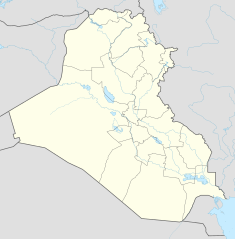The Al-Fakkah Field, also known as Jebel Al-Fauqi or Jebal Al-Fauqi, is an oil field located in southern Iraq's Maysan Governorate and Khūzestān Province, Iran. The oil field produced 50,000 barrels per day (7,900 m3/d) prior to the 2003 Iraq War and is part of the Maysan oilfield complex that altogether holds reserve of 2.5 billion barrels (400×106 m3).[1][2] The oil field is considered shared but an area of dispute between Iraq and Iran. Iraq unsuccessfully put the oil field up for bidding in 2009.[3]
| Al-Fakkah Field (Arabic: حقل الفكة) [1][2] | |
|---|---|
| Country | Iraq, Iran |
| Offshore/onshore | onshore |
| Coordinates | 32°02′N 47°37′E / 32.033°N 47.617°E |
| Operators | Iraq Ministry of Oil, Iran Ministry of Petroleum |
| Field history | |
| Peak year | 1979 |
Iraq and Iran dispute
editIraq and Iran have been in dispute over the Fakkah oil field and other adjacent fields such as the Abu Ghurab, and Buzugan since 2003. In the past, Iraq has accused Iran of "horizontal drilling" in the Fakkah field. This would entail Iran drilling into Iraqi territory to search for oil. The two sides also dispute the precise location of the border. In 2009, Iran had begun to make incursions into a disputed area of the Fakkah field but were often turned away by Iraqi workers.[1]
On December 18, 2009, about a dozen Iranian troops crossed three hundred yards into Iraq and seized oil well No. 4 in the Fakkah Field, raising the Iranian flag on site. The incident infuriated Iraq who demanded that Iran withdraw. While the Fakkah oil field is considered shared, Iraq considers well No. 4 as theirs. The well was drilled in 1979 and initially produced 3,000 barrels (480 m3) per day. However, production on the well ceased in 1980 due to the Iran–Iraq War.[4][5] On December 21, after a series of political negotiations, Iran withdrew from oil well No. 4.[6]
See also
editReferences
edit- ^ a b c "Iranian Troops Occupy Oil Field in Iraq, Stoking Tension" – Wall Street Journal – December 19th, 2009
- ^ a b U.S. Department of Energy - Iraq Country Brief - June 2006 Archived 2010-01-06 at the Wayback Machine
- ^ Fakkah is a part of Iran's territory - Khabar Online - December 22nd 2009 Archived 2011-07-20 at the Wayback Machine
- ^ "Iranian forces fully withdraw from Iraq oilfield" – Reuters – January 27th, 2010
- ^ The Jebel Al-Fauqi Dispute PBS December 18th, 2009
- ^ "Iran army withdraws from Iraqi oil field after talks" – Independent – December 21st 2009
